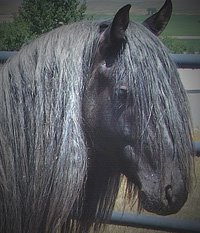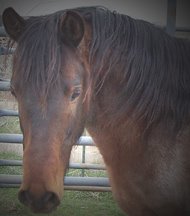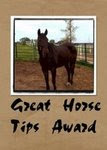 What treatments can effectively cure equine gastric ulcers? For too many horse owners, that is the $64,000 question -- almost literally, it seems! To make matters worse, attempts to answer the question are often rife with controversy. Below is an introduction to the most common pharmaceutical treatments, as well as some natural alternatives.
What treatments can effectively cure equine gastric ulcers? For too many horse owners, that is the $64,000 question -- almost literally, it seems! To make matters worse, attempts to answer the question are often rife with controversy. Below is an introduction to the most common pharmaceutical treatments, as well as some natural alternatives.Omeprazole
Omeprazole is a proton pump inhibitor that halts the production of stomach acid, allowing ulcerated tissue to heal. Omeprazole’s key weakness is its susceptibility to rapid destruction by gastric acid. This means that omeprazole will be most effective if administered in conjunction with ingredients that protect the drug long enough to permit its absorption into the bloodstream. Omeprazole is available in a variety of forms:
GastroGard and UlcerGard -- These Marial products are formulated specifically to ensure the desirable absorption of omeprazole by the equine body . The prescription version, GastroGard, boasts a body of research proving effectiveness in curing equine gastric ulcers. Non-prescription UlcerGard is labeled as a preventative and is therefore subject to less rigorous research and inspection than its Rx twin, but it appears the contents of the tubes are indeed identical; only the recommended dosages differ. Unfortunately, at $30 or more per dose, a month or more of treatment is beyond the reach of many a horse owner’s pocketbook.
Prilosec -- This human form of omeprazole does not contain the necessary protective carrier and is, therefore, ill-suited to use in equines. However, anecdotal evidence suggests some horses have enjoyed at least some benefit from the administration of Prilosec.
Compounded omeprazole -- Compounded medications consist of a mixture of ingredients, presumably combined with a particular effect in mind. Compounded omeprazole, therefore, includes some omeprazole in combination with other ingredients. The actual quantity of omeprazole in such compounds varies widely – some say omeprazole may comprise anywhere from 20% to 90% of the compound – and this variation would seem to account for the diversity of results achieved through its use. Though available for about one tenth the price of GastroGard, compounded omeprazole may not permit bioavailability of the critical drug, and it may not be shelf stable.
The results of a University of California, Davis, study indicate that GastroGard is more effective than compounded omeprazole for curing equine gastric ulcers and preventing their recurrence. Some have questioned the validity of this research, saying it is limited, flawed, and influenced by Merial as a funding source.
Long-term, low-dosage use of GastroGard/UlcerGard is frequently recommended for prevention of EGUS recurrence in ulcer prone horses. Aside from the financial burden of such a regimen ($7-$10 USD per day), however, it bears remembering that horses produce gastric acid for a reason. Stomach acid aids in the breakdown of dietary protein and destroys potentially harmful bacteria. Protracted suppression of stomach acid, therefore, may result in inefficient use of dietary protein and/or predispose the horse to stomach tract infections. In humans, long term acid suppression leads to poor absorption of Vitamin B12; this may or may not be a factor in equines.
Sucralfate
Administered orally in the form of pills dissolved in water to form a paste, sucralfate adheres to existing gastric ulcers, reducing pain and continued deterioration. However, it has no proven curative effect, and because it adheres only to ulcerated tissue, it will not serve as a preventative for horses that do not already have ulcers.
Ranatidine
Ranitidine is a histamine receptor antagonist that suppresses acid secretion but does not block acid production. It is somewhat effective for curing equine ulcers and is considerably cheaper than GastroGard, but must be administered every 8 hours and is only effective if training is suspended for the duration of treatment. For these reasons, ranitidine is typically rejected as impractical.
A 2005 study at Murdoch University in Australia indicates that ranitidine is less effective than omeprazole at curing EGUS.
Alternative Treatments
The internet is rife with anecdotes touting the effectiveness of various alternative cures for equine gastric ulcers. Unfortunately, research to support such claims is sadly lacking. Below are links to a few options, some of which are presented in an alarmingly pseudoscientific manner, but all of which have their own contingent of proponents:
Okra Pepsin E3
Chamomile tea and slippery elm bark powder
Aloe , sometimes in combination with MSM or slippery elm bark
Certainly chamomile, aloe, and slippery elm all have ancient reputations as soothing substances. Both slippery elm bark and okra form a mucilaginous gel reputed to calm and protect the stomach lining. Chamomile has long been used as an anti-inflammatory antibacterial agent, thanks to the natural chemical chamazulene; it also contains A-bisobal, which is believed to hasten the repair of damaged tissues. Methylsulfonylmethane (MSM), a naturally derived sulpher product with anti-inflammatory properties, is frequently used to treat joint problems in equines; some believe it may also enhance the curative benefit of aloe or other substances by increasing absorption through enhanced circulation.
All these alternatives appear to be low risk, and anedcotal evidence suggests that they may have at least some efficacy in horses with EGUS. For details, consult your local witch doctor.
The Conclusion?
Draw your own. When Aaruba was diagnosed with ulcers, I followed my vet's recommendation to administer a full course of GastroGard. Its positive effect was obvious after only five days, but when the 30-day treatment ended, the ulcers recurred almost immediately. Others report more complete success with GastroGard, and still others say compounded omeprazole or alternative treatments benefited their horses. The choice is up to you, your vet, and your bank account.
Regardless of how you treat them, chance are you'll need to take steps to prevent recurrence of EGUS. The next post in this series will compare a variety of supplements billed as ulcer preventatives.
____________________________________________________
Related Posts
Introduction: Equine Gastric Ulcer Series
Strategies for Prevention of Equine Gastric Ulcer Syndrome
Equine Ulcer Supplement Options
EGUS, Endurance, and the AERC
A Fair Question: Equine Athletes, Equine Ulcers
Bringing it Home: EGUS Prevention at In the Night Farm
Sheer Brilliance: Aloe and MSM as Alternative Therapy for EGUS
Q & A: Aloe and MSM as Alternative Therapy for EGUS
The Good Bad News: Gastric Ulcers in Equines
____________________________________________________
Has this series been helpful to you?
Subscribe to The Barb Wire









4 comments:
Hmmmmm. Seems like sucralfate might not be a bad option to at least try.
My daughter took that for years.
But then, she's not a horse, though she thinks she is.
I am going to bookmark this post for the eventuality that I need this info. Thanks for so carefully researching the options. I hope it clarifies your choice for you.
I am having a little contest of my own over at Enlightened Horsemanship Through Touch, and I'm hoping you'll stop by to check it out. I'd be honored if you contributed.
This is good information. I'm against medicating animals (and people) unless it is absolutely necessary.
Bravo for posting alternative options to the meds!
Gorgeous photo!
Thanks for a great over view, i have two rescue ponies who have suffered much stress, over acid stomach/ ulcers and metabolic changes, I have found homeopathics, administered on individual symptoms, chamomile and slippery elm certainly help as does other herbs, for more specific symptoms. These ponies tho genetically "tough" are extreamly sensitive to thier modern enviroment, it actually makes managing them really difficult. Drought and climate change is compounding the stress.
Post a Comment